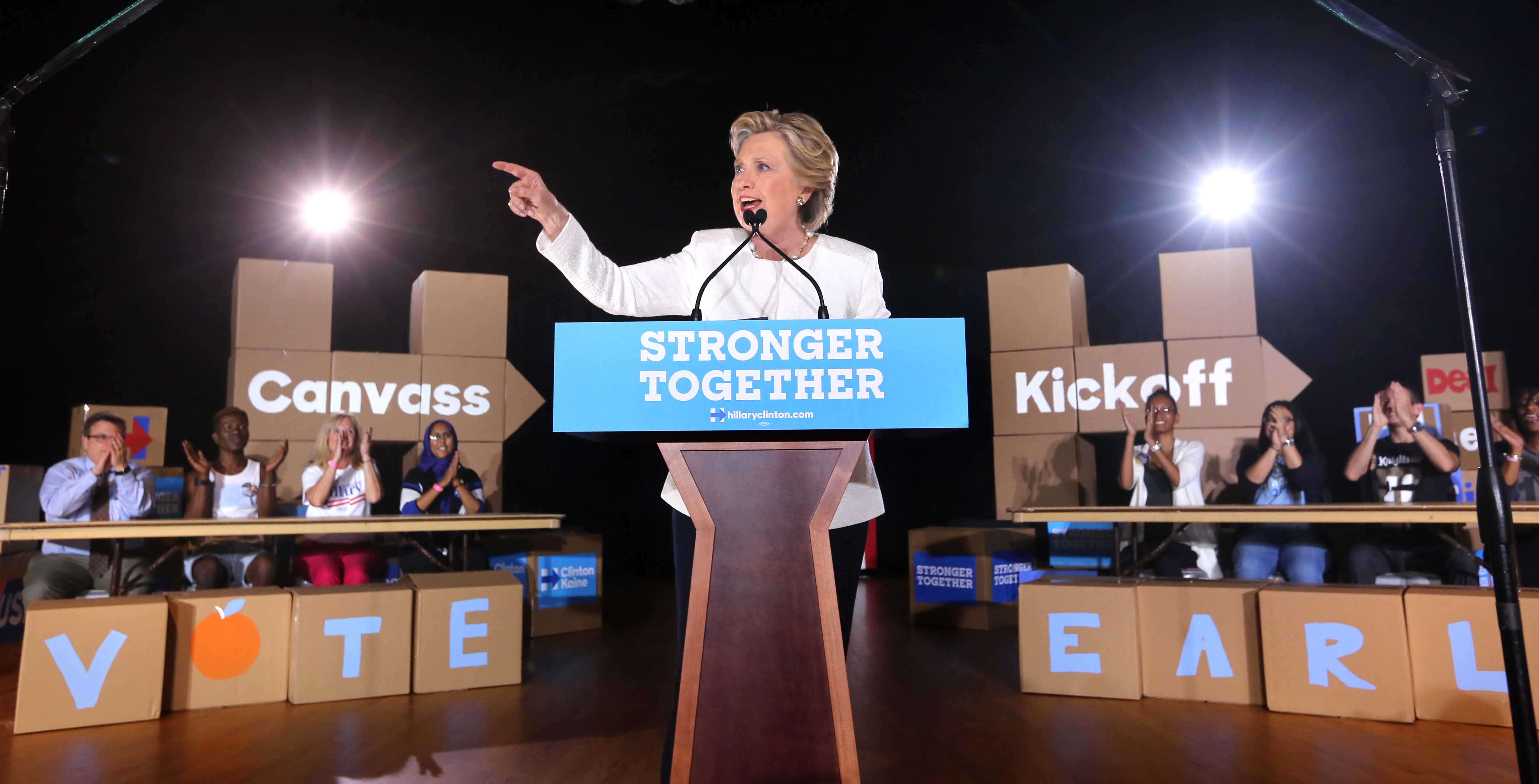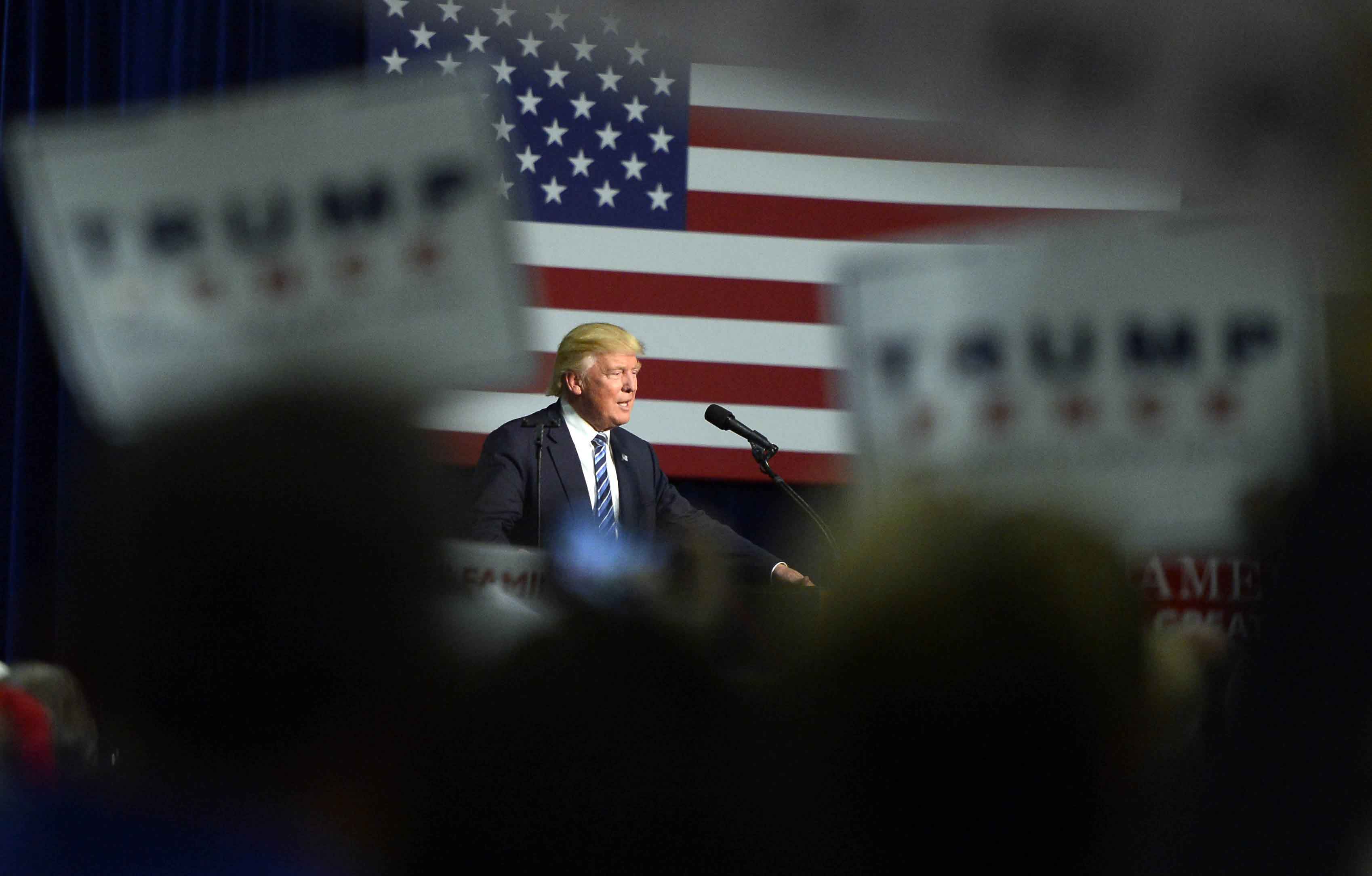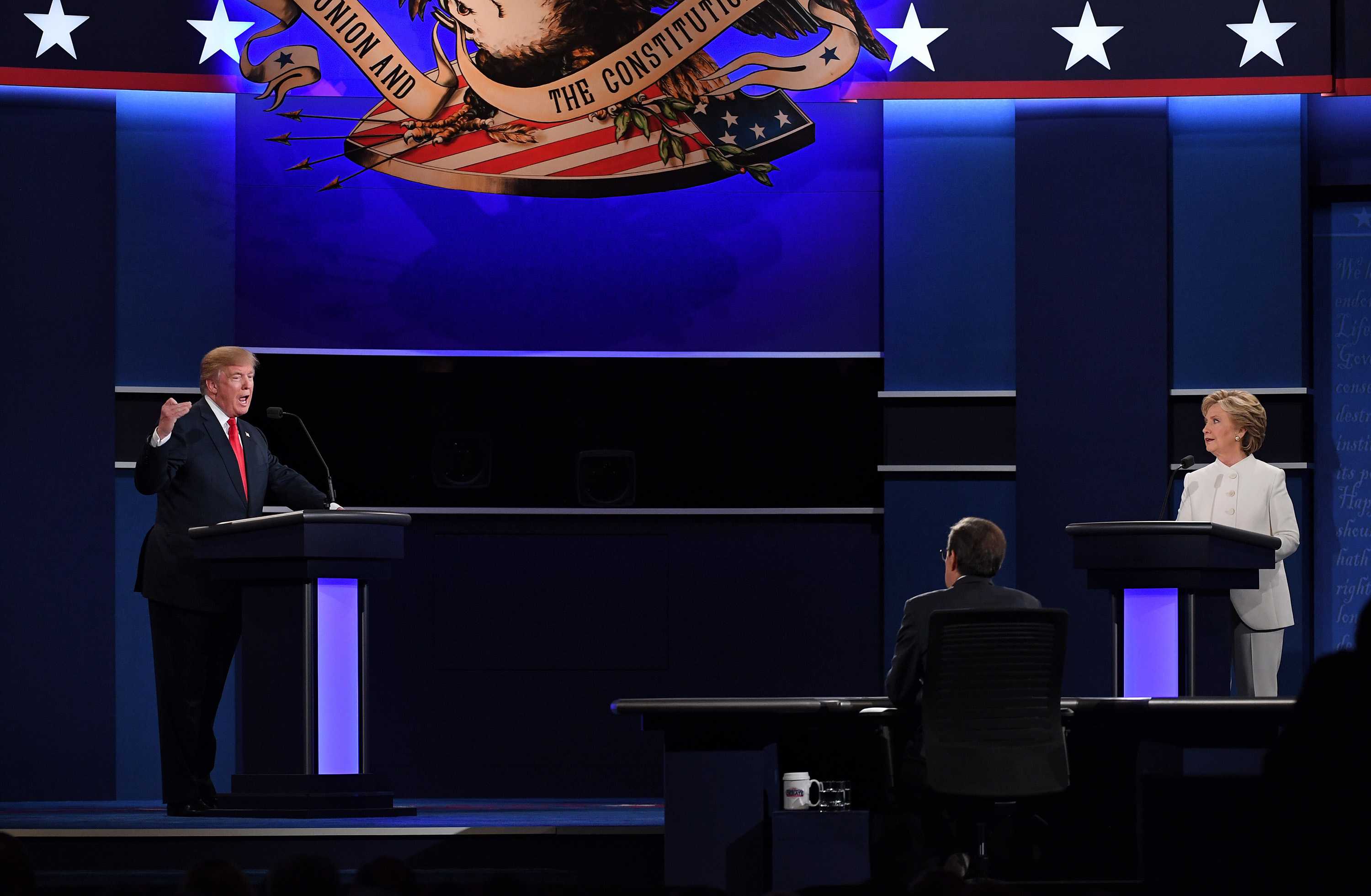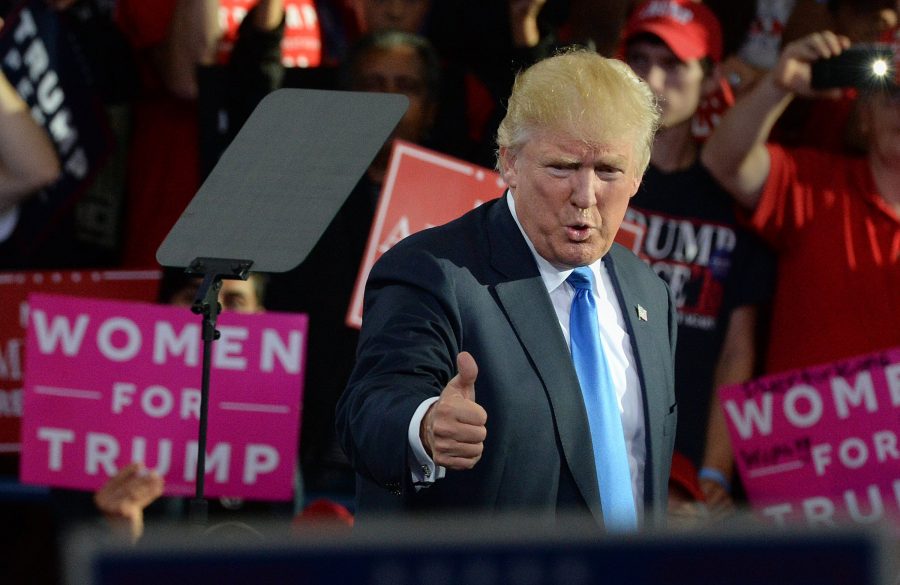Donald Trump wins presidency in historic upset
Donald Trump gives a thumbs up to the crowd as he finishes his speech at Dorton Arena Monday, Nov. 7, 2016 in Raleigh N.C. (Chuck Liddy/Raleigh News & Observer/TNS)
November 9, 2016
WASHINGTON — Donald Trump pulled off a stunning victory early Wednesday in a bitter presidential race, according to The New York Times.
Even as Hillary Clinton racked up large majorities in the nation’s diverse urban regions, Trump confounded the polls with victories in battleground states such as Florida and North Carolina.
With Republicans also beating the odds in close Senate races, the party stood on the verge of having a united government. Clinton, by contrast, would probably face a unified Republican Congress if she succeeded in eking out a presidential victory.
Advertisement
Amid unusually high turnout in several keenly contested states, Clinton received strong support from minority voters, especially Latinos, and did much better among college-educated white voters than any previous Democratic nominee.
Trump, however, countered by piling up huge majorities among the non-college-educated, blue-collar whites that have long been the mainstay of his support.
The result was a series of tight races in battleground states as the red swaths of the nation’s political map became much redder, even as many of the blue areas became bluer.
Clinton won Virginia and Colorado, according to exit polls and nearly complete returns. Both were swing states in which her campaign had long expressed confidence. But Trump countered with apparent victories in Ohio and Florida, where his Election Day turnout wiped out a big Clinton early-vote lead.
As financial markets absorbed the possibility that Trump might win the presidency, futures dropped, as did the Mexican peso. Markets had risen significantly in recent days as most polls showed Clinton’s position strengthening.
The voting came at the close of a tumultuous campaign in which Clinton sought not only to become the first woman elected president but also to win a third term for her party in the White House — a difficult task last accomplished by George H.W. Bush more than a generation ago.

Democratic presidential candidate Hillary Clinton speaks at a campaign rally in Sanford, Fla., on Tuesday, Nov. 1, 2016. (Joe Burbank/Orlando Sentinel/TNS)
The campaign repeatedly upset expectations: Clinton, despite her quest to break a glass ceiling that has persisted throughout American history, was cast as the candidate of the status quo. Trump, despite his vast wealth and political connections, successfully took the role of outsider, expressing the grievances and anger of much of the nation’s white working class.
Advertisement*
After a campaign as divisive as any in modern American history, dawn broke Tuesday to the sight of long lines of voters waiting patiently outside polling places, as if those people long ignored as the candidates squabbled had stepped in to protect the nation’s tradition of peaceful transitions.
Nationally, there were few reported difficulties beyond the usual snafus in a smattering of districts.
The generally smooth Election Day provided a counterpoint to a campaign that repeatedly brought to the surface deep division along lines of race, gender and class.
Time and again, the campaign swayed under the weight of the candidates’ weaknesses, with much of the worst damage to both being self-inflicted.
For Clinton, the most prominent drama centered on her use of a private email server to handle sensitive information during her tenure as secretary of State. The issue dogged her from the campaign’s opening days until its end, erupting once again less than two weeks before the election when FBI Director James B. Comey announced his agents were looking at a fresh batch of emails to ascertain their relevance.
Comey’s move stunned and angered Democrats. Then, in a final twist, he announced on Sunday that the FBI had completed its work and found that most of the newly discovered messages were duplicates of ones already reviewed.
For Trump, the problems centered on scores of insults directed at women, Latinos, blacks, Muslims and the disabled.

Republican presidential candidate Donald Trump speaks at a campaign rally at the Charlotte Convention Center in Charlotte, N.C., on Friday, Oct. 14, 2016. (David T. Foster III/Charlotte Observer/TNS)
The final stages of his campaign were convulsed by the release last month of a 2005 video in which he bragged of being able to get away with kissing women against their will and grabbing their genitals. Within days, a dozen women had accused Trump of unwanted advances. He denied all the accusations.
Despite their idiosyncrasies, the campaign was a classic insider-outsider clash.
Trump, the Manhattan real estate heir and billionaire, rode populist rage that reflected discomfort with the nation’s changing demographics and discontent about the disappearance of jobs that once had helped lift them into the middle class.
He was the outsider braying at the nation’s establishment, in every sphere, accusing those in charge of colluding in corruption even as he bragged that he was once a willing participant in the system that he decried.
Clinton represented an ample target for his attacks. She came to national note as the wife of the Arkansas governor who upended politics in 1992 by defeating President Bush.
After Bill Clinton’s tumultuous, impeachment-marked presidency — in which Hillary Clinton delved into policy by way of an unsuccessful healthcare program — she won a U.S. Senate seat in New York that proved to be a stepping stone to her unsuccessful 2008 run for the Democratic presidential nomination.
She served as secretary of State to the man who defeated her, a move that rebounded in her favor this year as the popular president campaigned in battleground states for her.
Her decades-long presence on the political stage helped her seize the nomination, but in the general election, she ran up against the inevitable desire of voters to change the party in the White House after two successive terms.
The irony of Clinton’s historic reach to become the first female president is that it played only a minor role in a campaign suffused with a soap opera’s worth of scandals.
Although both candidates made a stab at talking about policy proposals — Clinton with far more depth than Trump — the general election revolved instead around issues of character. Throughout, it was dominated by Trump’s larger-than-life persona.
Trump openly dismissed President Barack Obama, U.S. trade negotiators and military leaders as “stupid” and “losers.” He mocked Sen. John McCain of Arizona for being captured during the Vietnam War.

Republican presidential candidate Donald Trump, left, and Democratic presidential candidate Hillary Clinton participate in the third and final presidential debate at the University of Nevada Las Vegas on Wednesday, Oct. 19, 2016, in Las Vegas. (Yin Bogu/Xinhua/Sipa USA/TNS)
He criticized women in coarse terms. He physically mimicked a disabled New York Times reporter and, later, a pneumonia-stricken Clinton.
He refused to adhere to the most basic traditions of political candidates, never releasing copies of his income tax returns as every serious contender had done for decades and giving only cursory information about his health.
To more than a dozen Republicans who challenged him for the party’s nomination — and to many in the party’s establishment — he was unfit to lead.
To many of his party’s voters, however, rebelling against leaders they no longer found credible, Trump was a breath of fresh air, a bulwark against “political correctness.”
His biggest handicap was that Trump, who began the campaign in low esteem among the public, could never find a way to escape his deep unpopularity. Indeed, many of the traits that his most ardent supporters admired — his willingness to seemingly say anything, his determination to let no slight go unchallenged — alienated the broader swath of voters that many analysts believed he would need to attract.
In the early exit polls, 61 percent of voters said they had an unfavorable view of him, compared with 54 percent who felt that way about Clinton.
Trump’s backers, however, insisted that the political establishment was blind to the fervor in the country. Trump, they said, would win, not by converting those who doubted him, but by boosting the vote among the groups — especially older, white blue-collar voters — who already admired him.
Trump insisted that for all her experience, Clinton was fatally flawed. He called her “Crooked Hillary” and played on gender stereotypes as he insisted she required regular naps to get through the day.
“I have much better judgment than she does. There’s no question about that. I also have a much better temperament than she has, you know?” he said at the first debate.
But the extent of his own character issues was evident when, at that debate and later ones, listeners laughed.
As the campaign ended, the candidates finished it as they wished.
Trump coursed around the country feeding off — and into — the rage of his supporters, promising them relief from “elites” who had ignored them. His view of the nation he was fighting to lead was witheringly negative.
“Our country is a laughingstock,” he said on Monday in Florida. “All over the world, they’re laughing.”
___
(c) 2016 the Chicago Tribune
Visit the Chicago Tribune at www.chicagotribune.com
Distributed by Tribune Content Agency, LLC.
Advertisement










